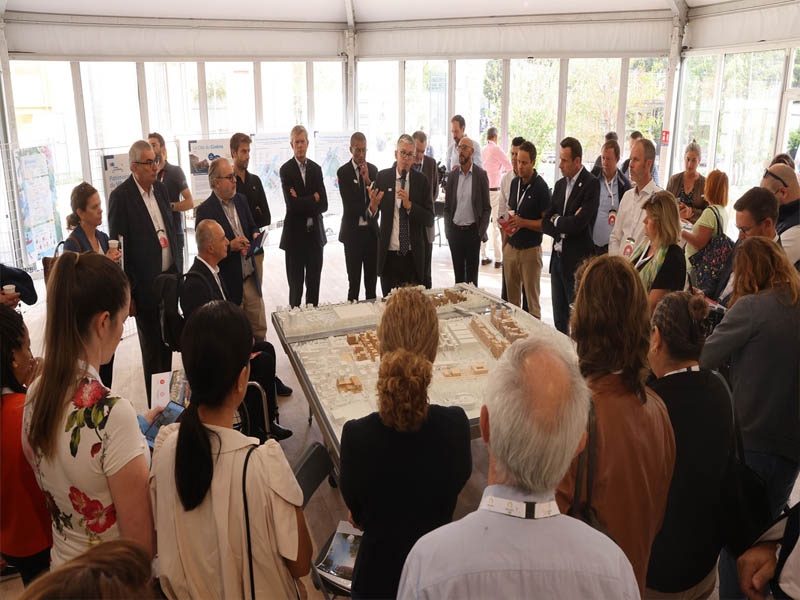The Olympic and Paralympic Games Paris 2024 are “right on track” – that was the message delivered by the International Olympic Committee (IOC)’s Coordination Commission this week following a visit to the French capital. Optimisations to Games delivery, meticulous budgetary planning and increasing engagement were highlighted as key to advancing Games preparations.
Speaking about the visit, the IOC’s Coordination Commission Chair, Pierre-Olivier Beckers-Vieujant, said: “It’s very encouraging to see all the great work being done by the team in Paris. We are right on track, and excitement is continuing to grow, not only in France but also among thousands of athletes around the world who are competing to qualify for these Games. Now, having marked two years until the Olympic Games begin in July, we are fully in the operational delivery phase. This means readiness – bringing together years of preparation to ensure these Games will make sport, Paris and France shine in the spirit of Paris 2024’s new slogan, ‘Games wide open’.”
Looking ahead, he continued: “Optimisation will remain an important focus for those involved in this project. Guided by the recommendations of Olympic Agenda 2020 and the New Norm, flexibility, creativity and close collaboration between all stakeholders will be crucial to identifying and implementing efficiencies. This will be key to achieving Paris 2024’s ambition and delivering a new era of Olympic and Paralympic Games.”
Tony Estanguet, President of the Paris 2024 Organising Committee, added: “I want to thank Pierre-Olivier and the Coordination Commission members for their support, guidance and collaborative approach, which is helping us deliver on our vision of ‘Games wide open’. We are particularly grateful for the IOC’s flexibility in line with Olympic Agenda 2020, which allows us to optimise our project in response to the current economic climate.”
He continued: “The encouragement from the Coordination Commission gives us the confidence we need to maintain the same level of ambition – to deliver the most ambitious Games in living memory. Games that are more open to the public, for example through a new venue concept and the Olympic Opening Ceremony being staged in the heart of the city; more engaging, thanks to innovations such as the Terre de Jeux 2024 label and Club Paris 2024, which has seen hundreds of thousands of people commit to the Games; and more socially responsible, by placing an emphasis on legacy and sustainability. With the latest polls showing 80 per cent of public support, we are very glad the French people are as enthusiastic as we are about this unique project.”
During the meetings, the Coordination Commission received an insight into the growing sense of anticipation in France, boosted by the launch of Paris 2024’s slogan – “Games wide open”. Increasing interest in Paris 2024’s engagement programmes reflects this excitement. Club Paris 2024 now has over 800,000 members, while Terre de Jeux 2024 includes more than 3,200 community projects, reaching more than 33 million people across the country.
While those programmes will make important contributions to Paris 2024’s legacy objectives, the Organising Committee highlighted its ongoing campaign to get school children to undertake 30 minutes of physical activity daily. This is already delivering a legacy for the Games, as shown by the fact that it has become a national policy in France. Since the campaign’s launch two years ago, one third of French schools are already part of the programme.
The Coordination Commission heard that engagement has also benefitted from Paris 2024’s commercial activities. This includes their growing licensing programme, and the progress of their commercial partnerships strategy. With 20 domestic partners already confirmed, the team in Paris explained that more are planned to be finalised within the coming months, with an objective of securing 80 per cent of partnerships before the end of the year.
Updates on Paris 2024’s extensive sustainability strategy, aimed at delivering climate-positive Games, were also provided. These summarised the continued efforts of the Organising Committee to reduce its emissions, as reflected by its innovative energy programme, its ambitious “Food Vision”, and its circular economy approach.
Key to achieving these sustainability ambitions is that 95 per cent of venues either already exist or are temporary. Earlier in the week, two of the new venues were visited by the Coordination Commission, both of which will leave lasting legacies for the local community.
One stop was the Olympic and Paralympic Village – a clear example of the Games stimulating sustainable urban regeneration. The properties, which will accommodate up to 14,250 athletes and team officials during the Olympic Games, will form a new residential district, offering around 2,800 family apartments along with extensive leisure, commercial, community and educational facilities, in line with the long-term development of the Paris region.
The other stop gave the Commission an insight into the progress being made on the Aquatics Centre in Seine-Saint-Denis. This venue was designed to address the needs of the local community, in an area that is seriously lacking in sports facilities and where one in every two children starting secondary school doesn’t know how to swim. The Organising Committee explained that the Aquatics Centre will not only house the pool post-Games, but also become a multi-sports facility open to all – one that will include fitness facilities, a climbing wall, a skatepark and areas for individual and team sports.
The next major milestone for Paris 2024 will be the launch of hospitality packages for the general public within the next few weeks, with more information about public ticket sales to be revealed in December. This follows the release of the finalised sports competition calendar by event earlier this year.
The Olympic Games Paris 2024 will take place between 26 July and 11 August, with the Paralympic Games taking place from 28 August until 8 September.

